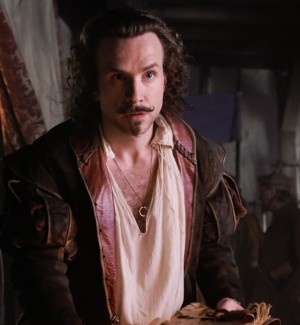‘Anonymous’ Will Have You Thinking, “What’s In a Name?”
What else could we expect from sci-fi film director Roland Emmerich, other than a world destroyed in his newest epitomic creation Anonymous? Filled with passion, scandal and “murder most foul,” the film fictionalizes an unbelievable scheme, pulling out all the bells and whistles along the way.
Emmerich, who directed Independence Day, The Day After Tomorrow and 2012, shifts his attention from the apocalypse to conspiracy theory, flipping history as we know it upside down on its head. What could be a plausible notion and plot is grossly exaggerated, making suspension of belief difficult for viewers.
Anonymous insults literature and the history of England, tarnishes the names of Queen Elizabeth I, William Shakespeare and Edward De Vere, and seeks to sway viewers to the Oxfordian theory with a far-fetched plot.
In the film, William Shakespeare is portrayed as nothing but a drunken, barely literate buffoon, Elizabeth I (played by the mother and daughter team of Joely Richardson and Vanessa Redgrave) as a rampant nymphomaniac, and Edward De Vere, 17th Earl of Oxford (Jamie Campbell Bower/ Rhys Ifans) a flighty, brooding genius who wrote the great plays that we know as Shakespeare’s work, and managed to hide this fact from the general public for nearly 400 years.
Emmerich brings to light the Oxfordian theory that “William Shakespeare” was nothing but a pseudonym for De Vere, whose creativity was stifled for both family and political reasons. The theory proposes that the Earl used the historical plays, such as Richard III, to secretly voice his political concerns.
Anonymous is, of course, fictionalized.
The film draws ties from the plays to De Vere’s life that we cannot be sure were there. Early in the movie, De Vere commits a rash, Hamlet-esque murder, stabbing his father-in-law’s friend and spy behind a curtain — an act which is not factual, but successfully pushes the plot forward. There is also the issue of Elizabeth I’s many illegitimate children—which, in the film, are too many to have been so successfully kept silent. At one point in the film, the character Ben Johnson (Sebastian Armesto) advises Shakespeare to stay off stage as, “Writers do not have time to act.” Would an Earl, then, have more time to write than a common actor, and subsequently be able to cover his tracks so well? The film also pins Shakespeare as the murderer of Christopher Marlowe, a detail that is just plain unnecessary to the movie’s plot, and serves only as an attempt to further the viewers’ scorn toward the man who has always been thought of as the greatest playwright and poet of all time.
Despite problems with the plot, and the depressing nature of the Oxfordian theory, Anonymous is aesthetically pleasing. The costumes crafted by Lisy Christl are beautifully intricate, though with all of the affairs Emmerich’s Elizabethans have, the clothing spends about as much time on the floor as it does being worn by the actors. The set is gloomy as Shakespearean England should be, and the globe theater set is impressive and filled with vile and rowdy spectators, as it purportedly was when the plays were performed. But it is the well-chosen cast that leaves a favorable impression – Ifans plays De Vere as a musing, oppressed playwright and Richardson’s Elizabeth I is glowing with long, red hair. She is, nonetheless, passionate when played by Redgrave, as she is moved to unfasten her bodice publicly, while watching one of De Vere’s plays.
“All artists have something to say, otherwise they would just make shoes,” De Vere says at one point in the film. If the plot of Anonymous were not as twisted as it is, Emmerich should be advised to become a cobbler. Still, the film is interesting due to the ridiculous amount of scandal involved. And though the film’s theatrical interpretation of the authorship question is much of a stretch, if the viewers are able to suspend belief for a while, this will not effect the excitement of the plot.
Rating: 2 out of 4


